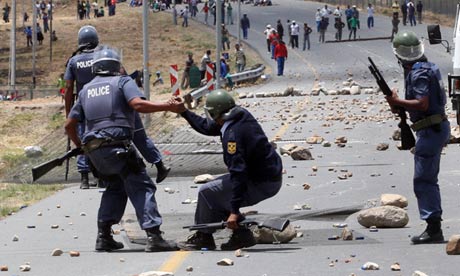South African farmworkers were dismissed "in truckloads" on Thursday after calling off the latest round of a strike for a daily wage of 150 rands (£10.65), their union said.
The Confederation of South African Trade Unions (Cosatu) warned of a new flare-up in the Western Cape as a result of what they called the farmers' "vindictive" response to the latest two-week strike in the £850m-a-year fruit and wine sector. Three farmworkers have died in clashes with police during stop-start strike action since November that have also led to hundreds of arrests.
The unrest comes with South Africa's economy recovering from a violent two-month strike in the mining sector in which 50 people died last year. In further civil unrest this week, four people died in Sasolburg, in the Free State, as unemployed residents rioted in protest at a municipal demarcation move which they believe will affect their job prospects.
Unions and charities supporting the Western Cape's 500,000 farmworkers say pay and working conditions are so bad that South African wines, table grapes and Granny Smith apples have no more of a place in the shopping baskets of responsible consumers than they had under apartheid.
"The government should be forcing the farmers to the table but it is not," said Nosey Pieterse, secretary general of black workers' agricultural sector union, Bawusa. "Our only weapon left is for the foreign retailers to pledge that unless the conditions are addressed, they will no longer import South African products."
Pieterse said he had been inundated with calls on Thursday from members who said they had been dismissed when trying to return to work.
"I do not know how many have been sacked but in one instance, truckloads of workers were dismissed. In Wolseley, trucks drove into townships and dumped the clothes of farmworkers that had been left behind on the farm," he said, adding that the Western Cape strike would resume on Monday unless President Jacob Zuma intervened and employers showed a willingness to negotiate.
But it is unclear whether the strike call will be heeded. Most farmworkers are not unionised, many are illiterate and face the danger of eviction because they live on their employers' properties.
Poorly-enforced labour rights and tenancy legislation as well as the pitifully low statutory daily minimum wage in the sector – 69.39 rands (£4.92) – perpetuate a culture of paternalism. In order to go on strike, workers have to stand up to employers alongside whom they work in the fields and who claim to make great sacrifices for their employees, such as providing tranport to clinics or to schools.
The latest round of strike action in the Western Cape came at the height of the table-grape harvesting and packing season. Many farms continued to work using non-unionised labour from outside the farming areas, said a spokeswoman for employers' organisation Agri SA, Portia Adams.
Only two businesses among the Western Cape's 5,000 farms negotiated pay rises with their workers during the latest strike, and signed up to a union call for no retaliatory sackings. The government has been silent on the issue, tacitly pointing to ongoing annual minimum wage talks.
But those fighting for farmworkers' rights argue that much more needs to be done. A 2011 report by Human Rights Watch found widespread exposure to pesticides, lack of access to drinking water or sanitation, and failure to pay sick leave. While the system of "dop" – payment in alcohol – has largely been abolished, the Western Cape still has the highest rates in the world of foetal alcohol syndrome.
Pieterse, a lifelong campaigner for farmworkers' rights, said: "The farmers are intransigent, vengeful and arrogant. Yet they are the beneficiaries of post-apartheid South Africa.
"In the first 10 years of democracy, the wine industry grew tenfold, from 20m litres output before 1994 to 220m litres. The farmworkers' conditions went the other way. Tenure rights laws were not accepted by the farmers. More than 1 million farmworkers were evicted. They remain slaves on the land of their birth."
But Agri SA said the strike had cost farmers 300m rands since November and that Bawusa and Cosatu were misrepresenting the situation.
"The workers have not been dismissed. The intake of seasonal workers is simply far lower now. Seasonal workers do not have contracts so it is not dismissal," said Adams.
She added: "Strikers engaged in illegal actions, including threats to farmers, violence and damage of property. If there were dismissals this was for disciplinary reasons."
Of the Western Cape's fruit production, 58% is exported and, in Britain, one of the main importers is Tesco. Giles Bolton, the company's director of ethical trading, said Tesco put in place an "ethical buying hub" in South Africa three years ago. It aimed to keep tabs on suppliers' treatment of their staff.
Bolton said: "The whole South African agriculture sector is very little unionised and it would help everyone if there was a more mature industrial relations atmosphere. However, it is not for us as a company to dictate to a foreign country that 'you must pay X'. I think the African National Congress government would query us for saying such a thing."

No comments:
Post a Comment